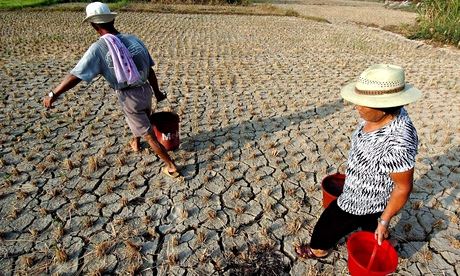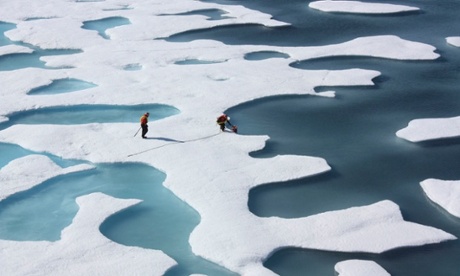 People in coastal regions of Asia, particularly those living in cities, could face some of the worst effects of global warming, climate experts will warn this week. Hundreds of millions of people are likely to lose their homes as flooding, famine and rising sea levels sweep the region, one of the most vulnerable on Earth to the impact of global warming, the UN states.
People in coastal regions of Asia, particularly those living in cities, could face some of the worst effects of global warming, climate experts will warn this week. Hundreds of millions of people are likely to lose their homes as flooding, famine and rising sea levels sweep the region, one of the most vulnerable on Earth to the impact of global warming, the UN states.
The report – Climate Change 2014: Impacts, Adaptation and Vulnerability – makes it clear that for the first half of this century countries such as the UK will avoid the worst impacts of climate change, triggered by rising carbon dioxide levels in the atmosphere. By contrast, people living in developing countries in low latitudes, particularly those along the coast of Asia, will suffer the most, especially those living in crowded cities.
Environment Climate change Global warming to hit Asia hardest, warns new report on climate change
Exoxon Valdez 25years later: 'Beaches and wildlife will never entirely recover'
 [On March 24, 1989] more than 11 million gallons of black crude gushed into the pristine waters of Prince William Sound.
[On March 24, 1989] more than 11 million gallons of black crude gushed into the pristine waters of Prince William Sound.
...Oil reached beaches 650 miles away. Killer whales, eagles, otters, seals and thousands of sea birds died excruciating deaths while Alaska's famous salmon and herring were ruined. The pictures of distressed animals expiring and grief-stricken locals trying to scrub beaches coated with toxic filth shocked the world.
The event is still seared into the minds of those who witnessed it, even a quarter of a century later. But the Exxon Valdez has left more than memories.
U.S. Fisheries Killing Thousands of Protected and Endangered Species
 A new report by Oceana exposes nine U.S. fisheries that throw away half of what they catch, and kill dolphins, sea turtles, whales, and more in the process. These fisheries are even fishier than they smell.
A new report by Oceana exposes nine U.S. fisheries that throw away half of what they catch, and kill dolphins, sea turtles, whales, and more in the process. These fisheries are even fishier than they smell.
A new study released this week called Wasted Catch: Unsolved Bycatch Problems in U.S. Fisheries reveals the nine dirtiest fisheries in the United States. It’s a dirty bunch indeed, the waste between them accounting for nearly half a billion wasted seafood meals in the U.S. alone.
Culled by Oceana, the largest international organization for ocean conservation, the fisheries are ranked based on bycatch—the amount of unwanted creatures caught while commercial fishing. Combined, they’re responsible for 50 percent of reported bycatch nationwide.
Crews mopping up oil spill in Texas' Galveston Bay
Cleanup efforts have begun after a barge carrying nearly a million gallons of thick, sticky oil collided with a ship in Galveston Bay.
Coast Guard Petty Officer Andy Kendrick said Sunday morning that skimmers are recovering the oil that spilled in Saturday's collision and a boom is in place to protect environmentally sensitive areas.
Kendrick said the remaining oil is being moved off of the damaged barge.
While the seas rise in the Outer Banks and elsewhere in NC, science treads water
 There’s not much dispute these days, up and down the coast, about whether the ocean is rising. The question is: How high will it go here, and how fast?
There’s not much dispute these days, up and down the coast, about whether the ocean is rising. The question is: How high will it go here, and how fast?
North Carolinians must wait until 2016 for an official answer. That’s the law.
After promoters of coastal development attacked a science panel’s prediction that the sea would rise 39 inches higher in North Carolina by the end of this century, the General Assembly passed a law in 2012 to put a four-year moratorium on any state rules, plans or policies based on expected changes in the sea level. The law sets guidelines under which the Coastal Resources Commission, a development policy board for the 20 coastal counties, will formulate a new sea-level prediction to serve as the official basis for state planners and regulators.
Was the Los Angeles Earthquake Caused by Fracking Techniques?
 Was the 4.4-magnitude earthquake that rattled Los Angeles on Monday morning caused by fracking methods? It's hard to say, but what's clear from the above map, made by Kyle Ferrar of the FracTracker Alliance, is that the quake's epicenter was just eight miles from a disposal well where oil and gas wastewater is being injected underground at high pressure.
Was the 4.4-magnitude earthquake that rattled Los Angeles on Monday morning caused by fracking methods? It's hard to say, but what's clear from the above map, made by Kyle Ferrar of the FracTracker Alliance, is that the quake's epicenter was just eight miles from a disposal well where oil and gas wastewater is being injected underground at high pressure.
Don Drysdale, spokesman for the state agency that oversees California Geological Survey, told me that state seismologists don't think that the injection well was close enough to make a difference (and the agency has also raised the possibility that Monday's quake could have been a foreshock for a larger one). But environmental groups aren't so sure.
Climate change is putting world at risk of irreversible changes, scientists warn
 The world is at growing risk of “abrupt, unpredictable and potentially irreversible changes” because of a warming climate, America’s premier scientific society warned on Tuesday.
The world is at growing risk of “abrupt, unpredictable and potentially irreversible changes” because of a warming climate, America’s premier scientific society warned on Tuesday.
In a rare intervention into a policy debate, the American Association for the Advancement of Science urged Americans to act swiftly to reduce greenhouse gas emissions – and lower the risks of leaving a climate catastrophe for future generations.
“As scientists, it is not our role to tell people what they should do,” the AAAS said in a new report, What we know.
Another Firm That Evaluated Keystone For State Dept. Had Ties To TransCanada
The contractor that evaluated greenhouse gas emissions for the State Department's Keystone XL report is the latest company to come under fire for its ties to TransCanada, the prospective builder of the controversial pipeline.
A conflict-of-interest statement from the consulting firm ICF International, submitted to the State Department in 2012, reveals that the company had done other work for TransCanada.
How the Kings of Fracking Double-Crossed Their Way to Riches
Thanks to a series of shady deals with former subsidiaries—and massive cuts in royalties to unsuspecting landowners—the controversial shale gas firm is now awash in cash.
At the end of 2011, Chesapeake Energy, one of the nation’s biggest oil and gas companies, was teetering on the brink of failure. Its legendary chief executive officer, Aubrey McClendon, was being pilloried for questionable deals, its stock price was getting hammered and the company needed to raise billions of dollars quickly.
The money could be borrowed, but only on onerous terms. Chesapeake, which had burned money on a lavish steel-and-glass office complex in Oklahoma City even while the selling price for its gas plummeted, already had too much debt.
More Articles...
Page 37 of 157

 Environmental News Archive
Environmental News Archive


































